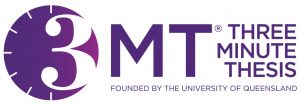
Presenting your 80,000-word thesis would take about 9 (probably rather dreary) hours. Can you boil it down to … 180 engrossing seconds?
Three-Minute Thesis® (3MT) is a research communication competition developed by the University of Queensland, Australia. It challenges graduate students in all research programs to present a compelling oration on their thesis and its significance in just three minutes, in language appropriate to a non-specialist audience.
Only one static slide or graphic is allowed, and no audio or moving video is permitted. A multidisciplinary faculty panel judges the contestants on comprehension, content, engagement, and communication. That is:What is your research about? Why is it important? What makes it cool?
The 2024 Syracuse University Three-Minute Thesis champion is Nimisha Thakur (PhD, Anthropology), for her oration, “River Song: Riverine Futures Amidst Climate Change on the Brahmaputra Floodplains” (click link to view the presentation). Congratulations Nimisha! Qingyang Liu (PhD, Human Development and Family Science) took home the People’s Choice award by audience vote.
The grand prize is a high-end laptop and a year’s membership in the professional organization of the winner’s choice, along with the opportunity to represent Syracuse University in the Northeast Association of Graduate Schools 3MT competition.
Not sure what a winning 3MT presentation this looks like? See below for video of the competition’s previous winners, or consult superior performances from around the world on the 3MT website.
Three-Minute Thesis FAQs
Can Masters students compete? The 3-Minute Thesis is intended to highlight research conducted for the doctoral dissertation. Terminal Masters students in *research* (not professional) programs may compete, provided the project satisfies the thesis requirement (or thesis option) for their degree. Capstone projects, independent research, or work done for courses do not qualify.
I’m in the early stages with my dissertation. Can I still compete? You do not need to be near the end of your project as long as you are able to describe its purpose, scope and methods with confidence. A good rule of thumb is that if you have an approved dissertation proposal, you are far enough along.
I’m a non-native English speaker. Do I have a chance? 4 of 9 previous 3MT winners are not native speakers of English. Relative to enrollment, international students do better than domestic US students in the 3MT.
Can ESF students compete? Alas, no. Next-level-up competitions require that the winner be a Syracuse University graduate student.
I did it last year. Can I compete again? Unless you won, yes.
Previous winners (click on the titles to see their performances):
2023: Lei Wang (Instructional Design, Development & Evaluation), “Decision Making Matters: A Learning Resources Tool to Prompt Deeper Learning”
2022: Adam Cucchiara (Public Administration and International Affairs), “Essays on Military Veterans in Law Enforcement”
2021: Diana (Dee) Katovitch (Higher Education), “Bridges to the Ivory Tower: Students with General Learning Disabilities Disrupting Higher Education”
2019: Ying Zhang (Human Development and Family Science), “Father Involvement, Relationship Quality, and Maternal Postpartum Depression”
2018 (Syracuse University/SUNY ESF): Farah Nibbs (Environmental Engineering), “Ferrocement-Biosand Rainwater Tanks as a Low-Cost Method of Improving Water Security and Climate Change in Small Island Developing States”
2017: Woosang Hwang (Human Development and Family Science): “The Impact of Paid Family Leave Policy on Fertility Decisions in Employed Families”
2016: David Moss (Earth Sciences): “The Evolution of Extreme Longevity in Modern and Fossil Bivalves”
2015 (Syracuse University/SUNY ESF): Laura Bartock (Environmental Communication and Participatory Proceses), “Walking the Talk? Examining the Practical Application of Theoretical Models of Science Communication in Long-Term Ecological Research Sites”
2014: Lex Jing Lu (History), “Physiognomy, Beauty, and Political Power in Late Imperial and Modern China”
